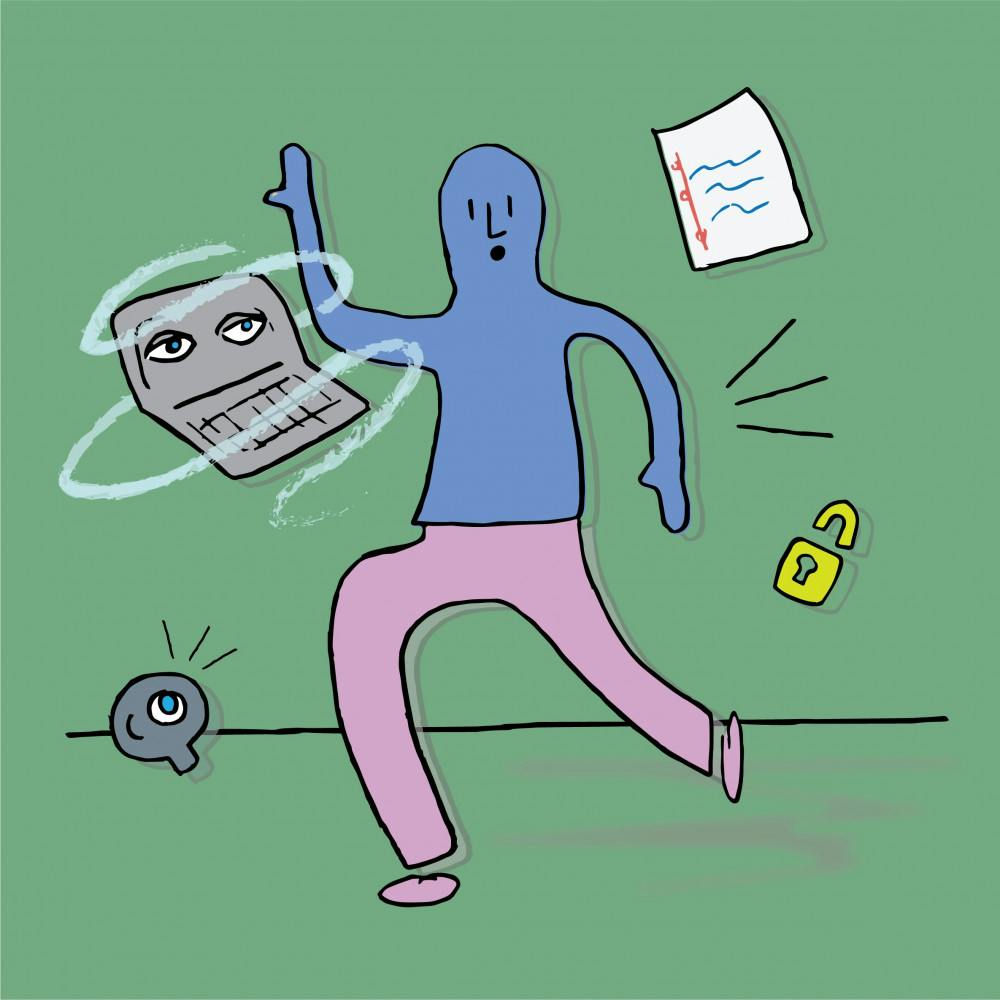Nicolas Garcia waited nearly an hour for an online proctor to scan his room, ID and testing area to take a virtual exam for his Legal Environment of Business class. The 20-year-old UF business administration senior said he was used to online classes, but he had never waited this long to take an exam before the pandemic.
UF transitioned all Spring classes online March 16. The university later announced that all Summer classes would also be online.
Since schools and universities transitioned in-person classes to remote learning, the demand for test proctoring services increased, leading to longer wait times for exams, said Brian Marchman, UF Assistant Provost and Director of Distance & Continuing Education. And students have raised concerns about their privacy while using test proctoring services that record them, like ProctorU and Honorlock, Marchman said.
These testing programs have the ability to record students and their screens as they take exams and take pictures of their photo ID. The programs can share this information with universities, according to the Honorlock and ProctorU privacy policies.
Information can be shared with universities to preserve academic integrity, Marchman said.
The university is aware of student concerns about collecting data and privacy, but UF’s policies ensure that the software is safe, Marchman said.
His office ensured that the services meet UF’s standards for security and privacy in their contracts, he said. Honorlock and ProctorU have passed a technical test that makes sure they only collect necessary data, which in this case would be data that ensures academic integrity.
But he said he understands why students would be concerned about the security of their data.
“We really work hard not to be invasive and protect the students’ rights, but as you know, we live in this world of trade-offs,” he said. “If we're going to be doing this remotely and more conveniently, we do give our partners glimpses into students’ world.”
Privacy concerns were raised in the Spring when Avast, an antivirus software recommended by UF, sold user data such as IP addresses and search histories to third parties like Microsoft and Amazon.
Spring semester was the first time that Nicholas Gabri, a 25-year-old UF mechanical engineering master’s student, used Honorlock. He said he thinks Honorlock is more invasive than ProctorU because Honorlock can access your Wi-Fi and all the devices that run on it.
“That's just really invasive and overly invasive for a simple testing client,” Gabri said.
Honorlock cannot access student’s networks, Tess Mitchell, Vice President of Marketing at Honorlock said. Because Honorlock is a Chrome extension, they can only access the Chrome browser while a student is taking their exam.
Honorlock can only track what is on a student’s browser during an exam and record the student during the test, according to Marchman.
Honorlock can also collect student’s IP addresses and locations, but they do not save that information, Mitchell said.
Gabri said that he uses a “burner computer,” a computer used only for his exams, that he will reset once he graduates. He tried talking to his professors about alternatives to proctoring, but only one of his professors opted to use FaceTime for exams, he said. His other courses with larger class sizes were not able to offer the same alternative.
UF’s agreement with ProctorU will not supersede the company’s privacy policy, Stephanie Dillie, ProctorU’s Chief Marketing Officer wrote in an email to The Alligator. However, UF’s agreement with Honorlock will supersede that company’s privacy policy, Mitchell said.
Both agreements ensure that data collected from students is owned by the university, stored in the U.S. and not sold to third parties, Marchman said. ProctorU stores the data for seven years, and Honorlock stores it for one year.
Honorlock has permission to share the data with third parties to make improvements to the app, but it must be anonymous and unidentifiable, according to the proctoring company’s agreement with UF.
The only third party that is involved with Honorlock is LiveChat, a company that allows customers to speak with company support in real-time. Honorlock uses this function to connect students to proctors through their chat function, Mitchell said.
Honorlock can share data, including the student’s school, exam, date and first name, to the proctor on the LiveChat function. This data is not collected and is only shared for the conversation, Mitchell said.
Marchman said he is not aware of Honorlock sharing any data from UF students with third parties at this time.
ProctorU does not and cannot share data with any third parties, Dillie wrote in an email to The Alligator.
ProctorU can record the student and the student’s screen during the exam, Ashley Norris ProctorU’s Vice President for Academic Affairs wrote in an email to The Alligator. ProctorU can also take a photo of the student and their ID, and take note of their keystroke pattern, voice and IP address.
With online testing and proctoring, technical issues are among more concerns that students have. Gabri said Honorlock flagged him for cheating during a test when he wasn’t.
“I literally wasn't doing anything,” he said. “Then I had to go through all these steps to get my client [program] back up and running, and I lost a ton of time.”
Marchman said that students should communicate with the proctor if they are having issues with their exam.
“No one is trying to catch students cheating,” he said. “We simply are working to make sure that the academic integrity of the institution is preserved and that our processes and our degrees have value.”
Although Garcia doesn’t like using the proctoring systems, he said he understands why something like this would be necessary to prevent cheating. However, he said he knows students cheat even with the proctoring systems.
“If there's a will there's a way, so they're gonna find ways to cheat either way,” Garcia said. “It does help because there is a deterrence, you know, just the fear of ‘Don't cheat because they got you on camera now.’”
Contact Meghan at mmcglone@alligator.org. Follow her on twitter @meggmcglone.

Meghan McGlone is a UF junior majoring in journalism and English, and this year she’s the City and County Commission reporter. In past years, she’s served as the University Editor, the Student Government reporter, and other positions. Her favorite past time is eating gummy worms and reading a good book.






